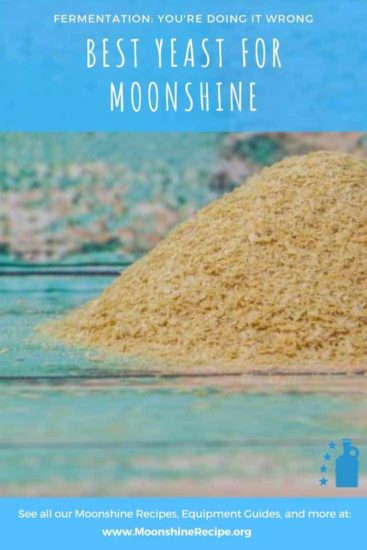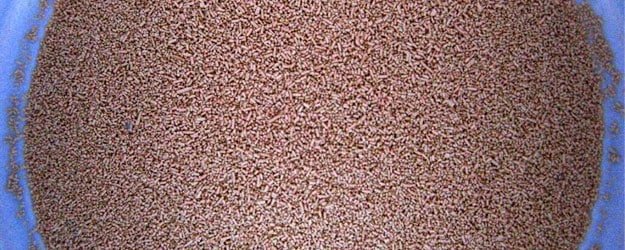Moonshine production is a complex, yet very fascinating experience that involves the application of various schools of science if looked into closely. The process of distillation itself relies on several principles of physics that ensure the extraction of spirit from the wash. Read our Yeast review below.
On the other hand, producing the wash in the first place is mostly a biochemical process that relies heavily on the microscopic fungal organisms known as yeast. And in this article we?ll be taking a closer look on why yeast is so important for producing quality moonshine and how to choose the right type of yeast to get the best results dripping out of your still.
Yeast review | Find out the best yeast for moonshine mash!
Yeasts Reviewed Here
4. SuperYeast | |||
What is Yeast and Why is it Important?
As mentioned earlier, yeast is a fungal single-cell microorganism that is used for producing the wash that gets distilled into the final spirit. As a matter of fact, yeast is used in various domains where the process of fermentation is involved.
I'm so excited to prepare so many #recipes of #drinks, #cocktails, #Moonshine, #food - I'm ready to get down to work! #Moonshinerecipe
The primary function of yeast is to metabolize the sugars contained in the mash into ethanol and certain by-products. And while moonshine producers might be interested exclusively in the ethanol aspect of this process, it would be wrong to discard the by-products altogether, as these can significantly impact the final quality and flavor of the spirit, in many ways determining the final type of the spirit coming out of the still.
Choosing the right type of yeast is paramount to producing quality moonshine, and can make all the difference between a flavorful full-bodied sipping whiskey that highlights the best qualities of the raw materials that went into the mash, and gas that?s only good for powering your lawnmower.
Obviously, most of our readers are interested in the former, so we?ll focus on selecting the types of yeast that work best for making moonshine that you?ll be able to enjoy.
Here's a great clip explaining when yeast is added to kick off the fermentation process from our all-time favorite show: Moonshiners!
The Different Types of Yeast
Although, the yeast used for different types of fermentation mostly belong to the same species Saccharomyces cerevisiae, there are thousands of different strains, each with its own individual properties that makes it more useful for a particular task.
Things like maximum liquor tolerance, optimal fermentation temperature, ability to process different types of sugars, production of aroma and flavor compounds ? these will all determine the character and quality of your wash, and each yeast strain will fall into a wide spectrum when analyzed by these criteria.
There are several groups of strains that are particularly popular for moonshine production due to their properties. Most importantly, these usually share high liquor tolerance that translates into more liquor obtained with the wash, which is obviously very useful when it comes to distilling high proof spirits.
Here's an overview of the best types of yeast for shinin':
Turbo Yeast
Owing its name to the fast fermentation cycle, Turbo yeast is a great choice when you don?t have much time for a lengthy wash production. Add up a very high liquor tolerance of 20-23% ABV and you get a very reliable and simple yeast to work with.
The downside, however, is that Turbo tends to produce a very dry and neutral flavor wash, which isn?t particularly good for full-bodied spirits like corn whiskey or rum.
Bread Yeast
Bread yeast is generally considered the best type of yeast for producing full-bodied and flavorful spirits, such as whiskey or rum, where you need the original sugar flavors to transit into the final product.
Among the downsides is lower liquor tolerance and longer fermentation times, especially when compared to Turbo yeast.
Champagne Yeast
Commonly used in wine production, Champagne yeast is a special beast as it?s known for high liquor tolerance, fast fermentation, and really dry finish. Not particularly useful for producing flavorful spirits, it?s still quite popular with clear spirits such as vodka, especially when using fruits in the mash.
Distillers Yeast
Low price and great availability, high liquor tolerance and fast fermentation ? these factors make generic distillers yeast a great choice for producing various types of spirits. Although, your results may vary significantly depending on the types of sugars used for making the wash.
Reviews of the Best Moonshine Yeast
Now that we have all the theoretical aspects covered, let?s get down to business and check out how the most popular yeast types stack up when tasked with producing quality wash.
We?ve used a fairly simple bill comprised of corn, barley and a bit of cane sugar in order to see how each yeast type is able to process the sugars and bring the mash flavors into the resulting wash. Here?s what we got after trying out some of the most popular moonshine yeast types:
This is the go-to yeast that can be used for making virtually any type of fermented fermented beverage, available in just any homebrew store by the pound. Its sheer popularity is largely due to the yeast?s ability to ferment just anything at a stable room temperature.
And that?s exactly what we?ve experienced after pitching this yeast into our mash and letting it sit for over two weeks. The resulting wash wasn?t anything to write home about, but it got the job done pretty quick and clean.
Pros
- Quick start and rapid fermentation
- Available just everywhere by the pound
- Very reliable with predictable results
- Can take on just any type of sugar to ferment
Cons
- Neutral flavor profile that may be lacking a bit in case of more complex spirits
- Fermentation can get really violent sometimes
Being a typical Turbo yeast strain, this product was the quickest among all the strains we?ve tested with our mash. Not to mention that the liquor content ended up being the highest in the entire batch.
The downside, however, was that the wash tasted passable at best with many off-flavors getting in the way. Guess thats the price you have to pay when you want things to done quickly!
Pros
- The quickest fermentation of the bunch
- Works great at room temperature
- High liquor tolerance
Cons
- Tends to produce noticeable off-flavors, especially at higher temperatures
- Can get pricey compared to other yeast types
A very reliable and versatile wine yeast that can be used for making various types of wine, mead, cider and even sodas.
With all that said, we?ve noticed that it had a tough time going through our grain-based mash as there was some residual sweetness in the wash after it was done. Still, tasted quite nice, so it might be useful for making moonshine with more flavor and body to it.
Pros
- A very versatile and reliable strain
- Works well at room temperature
- Little risk of stuck fermentation even with more complex sugars
Cons
- More suited for fruit-based mashes, grains are not as well processed
- Relatively modest liquor tolerance of 13,5% for a moonshine yeast
4. ??SuperYeast
With 20% ABV produced in just a week claimed by the producer it would be wrong to overlook this yeast for making moonshine.
But the initial feeling we had about this strain being just a variation of Turbo yeast was confirmed after we?ve pitched the yeast and left it for a day. The fermentation was so wild that it nearly blew off the lid from the bucket with all the foam it was producing.
So take note: always leave lots of headspace when working with this particular yeast. The resulting wash was definitely the strongest one we got from all the batches, but it tasted really harsh.
Pros
- Very rapid and active fermentation
- Alcohol tolerance of up to 20% ABV
- Works well at room temperature
Cons
- Flavor is a little harsh
- Fermentation can get vigorous
- Fermentation can stall if the temperature drops below 70F
We?ve added this product to our reviews more out of scientific curiosity rather than any practical reason. Most beer yeast strains have rather low liquor tolerance, which isn?t particularly useful for making a high liquor wash for moonshine. This strain, however, was specifically selected for its ability to ferment up to 12-13%, which puts it in the same league as some wine and distillers yeast.
On top of that, it?s well suited for fermenting maltose and other complex sugars obtained from grain starch, so this makes it a really interesting strain for grain whiskey. Well, at least on paper.
In reality, it fermented really well but ended up having a very specific spicy flavor reminiscent of that found in Belgian abbey beers, which might be not everyone?s cup of tea.
Pros
- Fast and clean fermentation in a wide temperature range
- Works well with grain-based mash
Cons
- Quite peculiar flavor, a bit peppery, spicy
- Modest liquor tolerance
The Winner
Choosing the right yeast always depends on the type mash you?ll be using for your moonshine.
Some strains work better with simple sugars and fruits, while others are more suited for grain-based mashes. Some bring out the flavor of the raw materials being used, while others deliver a very neutral flavor profile.
Thus, the best yeast for moonshine is the one that is best suited for the particular type of spirit you?re aiming for. That?s why it?s always important to decide what you really want to come out of your still, and choose the mash composition and yeast strain accordingly.
That said, we feel the Red Star DADY Yeast is probably the best of the bunch here overall as it didn't produce any harsh or odd flavors which is a good safe bet for your first runs. As you get more acquainted to your still and process, feel free to branch out
Share this article with your friends!

Want to know more?
[instagram-feed feed=1]

Moonshine Recipes
Moonshine recipes, cocktail recipes, infusions, distilling, beer and wine brewing, cooking, menu, food, cocktail and more
Empire Of Heaven Vodka Cocktail | 2023
moonshinerecipe.org
This is one of the easiest cocktail recipes to make.Pimm's Cup Recipe With Fruits & Ginger Ale Mix | 2023
moonshinerecipe.org
This cocktail is a wonderful time pass idea as well as great for regular sipping routine!Gin And Tonic Recipe | Tanqueray Gin Mix | 2023
moonshinerecipe.org
Learn this fabulous Gin and Tonic Cocktail?that is as easy as apple pie! This cocktail is a wonderful time pass idea as well as great for regular sippingGin Basil Smash Cocktail Drink Recipe
moonshinerecipe.org
Learn this fabulous Best Basil Smash Cocktail?that is as easy as apple pie! This cocktail is a wonderful time pass idea as well as great for regular sippingBest Selling Products For Daily Needed Shopping |
moonshinerecipe.org
We are excited to showcase some quality lists of products your body needs. Reviewed by users, written by experienced people about these products hand picked MoonshineRecipe.Org
MoonshineRecipe.Org












Do they not make hillbilly stills 48 hour turbo yeast dual purpose any more